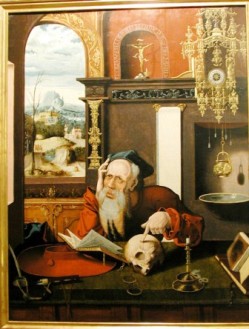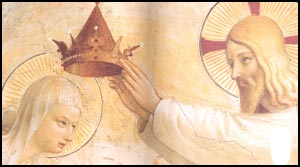 I just finished writing a column for The Wanderer. In this week’s burnt offering I was looking at the intercessions made after the consecration during the 3rd Eucharistic Prayer. Here is something of what I wrote:
I just finished writing a column for The Wanderer. In this week’s burnt offering I was looking at the intercessions made after the consecration during the 3rd Eucharistic Prayer. Here is something of what I wrote:
There is one mediator between God and man, the man God Jesus Christ our Savior (cf. 1 Tim 2:5). When we speak of intercession, we give the greatest prominence to what Christ has done and is doing for us now.
Nevertheless, because we in this vale of tears (the Church in its Militant guise) belong to a Church which includes the angels and saints (the Church in its Triumphant aspect), we also ask the intercession of other members of the Church, those yet living in this world, those who have gone before us, and those persons without material being, the holy angels. We therefore call upon their help from our confident trust in the solidarity of their charity toward us. From charity they desire what is best for our salvation and, in that love, they are willing to help us according to God’s will.
The great translator and sometimes irascible St. Jerome (+420) has a succinct explanation of why we call on the saints for help and why they respond to our prayers. Jerome is carrying on a polemic against a priest named Vigilantius, who had provoked Jerome on a number of fronts. Vigilantius claimed that once we are dead we cannot pray for the living. Jerome responded:
If Apostles and martyrs while still in the body can pray for others, when they ought still to be anxious for themselves, how much more must they do so when once they have won their crowns, overcome, and triumphed? A single man, Moses, oft wins pardon from God for six hundred thousand armed men; and Stephen, the follower of his Lord and the first Christian martyr, entreats pardon for his persecutors (Acts 7:59-60); and when once they have entered on their life with Christ, shall they have less power than before? The Apostle Paul says that two hundred and seventy-six souls were given to him in the ship (Acts 27:37); and when, after his dissolution, he has begun to be with Christ, must he shut his mouth, and be unable to say a word for those who throughout the whole world have believed in his Gospel? Shall Vigilantius the live dog be better than Paul the dead lion? (Contra Vigilantium 6).
There’s one in the eye for poor Vigi. What might St. Jerome have been like in the age of the weekly newspaper columns, cable news, and the blogosphere?
 The affirmation of one mediator between God and man does not exclude that we beg help from the saints and angels.
The affirmation of one mediator between God and man does not exclude that we beg help from the saints and angels.
Whatever merit we have for our salvation is from Christ, who, as St. Augustine (+430) explains, crowns His own merits within us (cf. ep. 194, 19 and, in the 2002 Missale Romanum, the Preface “de sanctis”).
However, even when we pray in our liturgical worship for the intercession of one or more of the “elect” in heaven, we raise the prayer through Christ Jesus our Lord.


































Thank you for this, Father. I recently had a discussion with a friend who is Evangelical, and who finds asking the dead to pray for us beyond the acceptable. I suppose he would judge any communication with the dead as sorcery. I wish that I would have had this article in hand.
I should like to put up a link to an old post of mine that contains one of my favorite testimonies to the reality of the Communion of Saints. St. Therese of Lisieux describes her nocturnal vision of Mother Anne of Jesus, the foundress of Carmel in France.
I love a cantankerous saint. St. Jerome is increasingly becoming one of my favorites.
I cannot fathom how any Christian, Catholic or otherwise, could ever hold that “once we are dead we cannot pray for the living.” Anyone who makes such a profession denies what Christ Himself said: “He who believes in Me will live, even though he dies; and whoever lives and believes in Me will never die…” (John 11:25)
Secondly, St. Paul teaches that “if we endure, we shall also reign with Him” (2 Tim 2:12). To reign with the Lord in the Kingdom is to do as He does: which is, to intercede for us (cf. Rom 8:34).
Finally, I do not believe that my logic is flawed in making the following deduction, based upon 1 Samuel 12:19-23:
19 The people all said to Samuel, “Pray to the LORD your God for your servants so that we will not die, for we have added to all our other sins the evil of asking for a king.”
20 “Do not be afraid,” Samuel replied. “You have done all this evil; yet do not turn away from the LORD, but serve the LORD with all your heart. 21 Do not turn away after useless idols. They can do you no good, nor can they rescue you, because they are useless. 22 For the sake of his great name the LORD will not reject his people, because the LORD was pleased to make you his own. 23 As for me, far be it from me that I should sin against the LORD by failing to pray for you.”
As there is no sin in heaven, but only perfect charity, then there must be intercessory prayer!
There are some who say that once we get to Heaven (presuming we are fortunate enough to do so) that God’s Presence is completely overwhelming. His Holiness, Goodness and Majesty are so great that we can do nothing else except worship Him and cannot turn our attention to anything else. So, it’s not that the Saints in Heaven do not want to intercede for us, its that they are unaware that we even exist.
How does one respond to this?
Wrong.
o{];¬)
It’s hard not to prefer the dead lion, particularly today on the anniversary of St Thomas More’s execution.
Jerome is making a reference to Ecclesiastes Chpt. 9. ver. 4 (Qui enim sociatur omnibus viventibus, habet fiduciam: melior est canis vivus leone mortuo.) And he subsequently proceeds to explain why in the present case this does not apply.
“So, when your loving Mom dies, you don’t think she is going to still be looking after you?”
The same people who will deny the intercession of the saints at the same time will admit they “know” that someone dear to them who has died, is still helping them and is looking down on them from heaven.
Somehow, when put into concrete terms of someone they know and love, the concept is easier to grasp than the vague philosophical idea [to some] of saints.
I thought there was a New Testament author who says that when he is no longer in the flesh he will be a greater advocate for us before God. Am I mixing up some other things to get that? I can’t remember which it was and I can’t seem to find it through automated searches, and if I start actually flipping through the pages of my Bible I’ll be here all night and probably still never be able to comment…
The Cobbler says: I thought there was a New Testament author who says that when he is no longer in the flesh he will be a greater advocate for us before God. Am I mixing up some other things to get that? I can’t remember which it was and I can’t seem to find it through automated searches, and if I start actually flipping through the pages of my Bible I’ll be here all night and probably still never be able to comment…
Perhaps you are thinking of St. Dominic. This is the theme of the traditional Dominican chant O Spem Miram:
O wonderful hope which thou gavest to those who wept for thee at the hour of thy death, promising that after thy departure thou wouldst be helpful to thy brethren. Fulfill, O Father, what thou hast said, and help us by thy prayers.
To Cobbler:
Perhaps Romans 8 is in the mix.
“So, when your loving Mom dies, you don’t think she is going to still be looking after you?”
Not sure about that.
When a beloved person dies, what a good Catholic should in my eyes do is to assume that this soul is in *purgatory*. Therefore, he should – in my opinion- focus on praying for this soul, rather than assuming that this soul is praying for him. As I see it, *this is our time to give, not to receive*. In turn, the saints in Paradise will pray for us.
The idea – that I have heard from many Catholics – that our dearly departed are pretty automatically in heaven seems pretty Protestant to me. On the contrary, I would say that when a beloved one dies is when he needs our prayers the most, and we must endeavour to, so to speak, “push him to Heaven” through our prayers as hard as we can.
I wonder how the matter would have been seen, say, in Don Camillo’s times. I’d rather think the assumption was that the departed is in purgatory, and that he needs our prayers.
Mundabor
Hebrews 12:1?
Most folks I’ve run into, whose churches don’t believe in the intercession of the saints, believe in the “soul sleep” idea — that the souls of the faithful dead are snoozing or unconscious until the general resurrection, and thus don’t know anything going on and can’t do anything or even pray.
Of course, a lot of these same people also picture some sort of afterlife or reunion with friends and family, so there’s usually someplace to argue if you can get them talking.
Mundabor I agree with you.
My mother died in 2006 and my daughter, who was 16 at the time, was very close to her.
She was a good woman and I know she is not in hell. But it would be foolish of me to assume she is a Saint. I do think she is a Saint (what Italian boy worth his salt doesn’t think his mother is a Saint :) ) but if she is in purgatory she requires prayer and penance so I have to do this for her just in case. If she is indeed a Saint, those prayers and penance won’t be wasted.
This is what I explained to my daughter. I also told her that, in the event her grandmother is already a Saint, it’s ok to pray to her for intercession. My daughter lit up at the thought of that.
My Lord I pray for my dear mother, with whom you blessed me on this earth, that she be taken unto you as she longed to be. If You have already taken her unto you, please dispose of my prayers as You will for the souls still in purgatory. And I pray to my dear mother that from heaven she pray for me and my family.